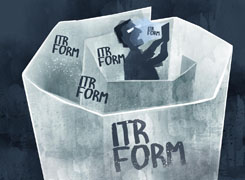Ulhas Joshi | Answer |Ask -Follow
Mutual Fund Expert - Answered on Mar 01, 2024
Prior to joining RankMF as CEO, he was vice president (sales) at IDBI Asset Management Ltd.
Joshi holds an MBA in marketing from Barkatullah University, Bhopal.... more

I am 47 years and have my wife and three children Want to invest 5 lac monthly on mutual fund What is the expected amount of return in the next 10 years and 15 years and 20 years
You may like to see similar questions and answers below
Omkeshwar Singh | Answer |Ask -Follow
Head, Rank MF - Answered on Jul 08, 2022
Omkeshwar Singh | Answer |Ask -Follow
Head, Rank MF - Answered on Nov 20, 2019
Ramalingam Kalirajan |8319 Answers |Ask -Follow
Mutual Funds, Financial Planning Expert - Answered on May 15, 2024
Dr Nagarajan J S K |367 Answers |Ask -Follow
NEET, Medical, Pharmacy Careers - Answered on May 05, 2025
Prof Suvasish Mukhopadhyay |615 Answers |Ask -Follow
Career Counsellor - Answered on May 05, 2025
Dr Dipankar Dutta |1197 Answers |Ask -Follow
Tech Careers and Skill Development Expert - Answered on May 05, 2025
Radheshyam Zanwar |1599 Answers |Ask -Follow
MHT-CET, IIT-JEE, NEET-UG Expert - Answered on May 05, 2025
Radheshyam Zanwar |1599 Answers |Ask -Follow
MHT-CET, IIT-JEE, NEET-UG Expert - Answered on May 05, 2025

EEE (Electrical and Electronics Engineering) at IIIT Gwalior (ABV-IIITM) can be a decent choice. But if you're strictly interested in core electrical engineering, other colleges (like NITs) might be a better option because not many EEE-core companies visit the campus in comparison to CS/IT branches. Finally, if your interest is strictly in core EEE, IIIT Gwalior might not offer as many labs or core recruiters as older NITs or IITs with stronger electrical departments.
Follow me if you like the reply. Thanks
Radheshyam
If not followed, pl follow and like. Thanks
Radheshyam Zanwar |1599 Answers |Ask -Follow
MHT-CET, IIT-JEE, NEET-UG Expert - Answered on May 05, 2025
Prof Suvasish Mukhopadhyay |615 Answers |Ask -Follow
Career Counsellor - Answered on May 05, 2025

Prof Suvasish Mukhopadhyay |615 Answers |Ask -Follow
Career Counsellor - Answered on May 05, 2025

Mihir Tanna |1052 Answers |Ask -Follow
Tax Expert - Answered on May 05, 2025
Samraat Jadhav |2269 Answers |Ask -Follow
Stock Market Expert - Answered on May 05, 2025























